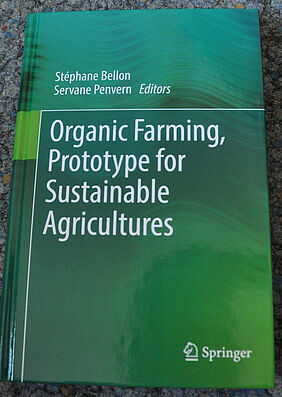Various stakeholders show a growing interest in organic food and farming, which has become a widespread issue at all levels of society. Multiple forms of sustainable agriculture are emerging: among which organic farming represents a prototype, evolving with strong interactions and tackling the multiple challenges facing sustainable agriculture.
An overview of the current challenges
The new book "Oganic Farming, Prototype for Sustainable Agricultures" with a preface by FiBL director Urs Niggli presents 25 papers divided into three sections. The first section investigates production processes and the capacity of organic food and farming to benefit from ecological regulations and system functioning to achieve a greater degree of self-sufficiency. The second proposes an overview of organic performance that provides commodities and public goods in response to societal demands. The third focuses on how to make different forms of organic agriculture mainstream; including development pathways for organic farming and up-scaling within agri-food systems and territories. In addition to a strong theoretical component, the book provides an overview of the current challenges facing organic food and farming. It shows bottlenecks and lock-in effects at various levels, highlights recent innovations and presents a critical appraisal of the state of the art of existing knowledge. It contributes to our understanding of the perspectives and future challenges for research in organic farming in France and the rest of Europe. Each area of organic food and farming is examined, with papers from leading experts who have been involved in organic research projects and partnerships for many years and who provide complementary insights into the key issues facing organic agriculture and research worldwide.
Chapters contributed by FiBL researchers
- Regulatory Framework for Plant Protection in Organic Farming by Bernhard Speiser, Lucius Tamm and Franco P. Weibel
- Conservation Biocontrol: Principles and Implementation in Organic Farming by Sylvaine Simon, Adrien Rusch, Eric Wyss (former FiBL researcher) and Jean-Pierre Sarthou
- Alternatives to Synthetic Chemical Antiparasitic Drugs in Organic Livestock Farming in Europe by Hervé Hoste, Smaragda Sotiraki, Helena Mejer, Felix Heckendorn, Veronika Maurer and Stig Thamsborg
- The Potential of Organic Agriculture to Mitigate the Influence of Agriculture on Global Warming – A Review by Adrian Müller and Claude Aubert
Further information
- Contact: Adrian Müller, FiBL Switzerland
- springer.com: Link to the website of the Springer-Verlag with an in-depth description of the book





